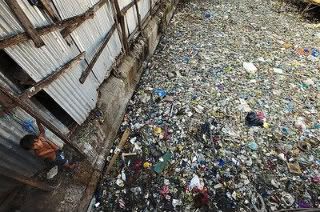

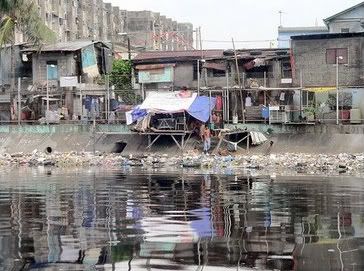
Fishermen hauled their boats down the garbage-strewn shores of their seaside lands. They pushed their vessels forward as they themselves waded into the waist-deep waters mixed with refuse and waste, deeper and deeper until the brackish filth was up to their chins. Then they pulled themselves up into their boats and began paddling out into the ocean.
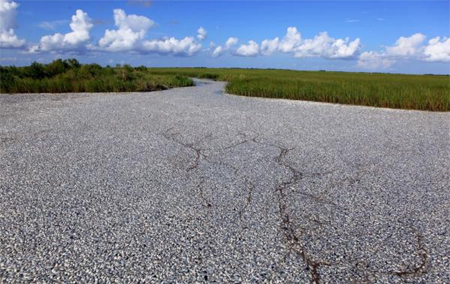
They passed through a mangrove of death, the bloated carcasses of fish floating as the gases of decomposition inside them buoyed them to the surface. The whole place reeked, putrid with the smell of decay, much like the scent of rotten eggs. The filth of human wastes spewed forth by broken sewage systems, the industrial pollution of off-shore corporate mining and drilling drifting to the shore, all were mixed by the tides and provided the perfect growth medium for microorganisms - toxic species of dinoflagelloids - to multiply and expand at a geometric rate. They consumed the oxygen in the waters, suffocating the fishies, while infesterizing them and killing them with toxins, making even their carcasses inedible and unfit for human consumption.
A seagull swooped down to eat one of the floating fishes, and as it swallowed the fishy it too was instantly affected by the poisoning. The seagull spasmed mid air and dropped like a brick, falling into the black lagoon with a plop.
The fishermen shook their heads at this. It wasn't like this, not in the past, in the old days when men respected nature and lived in harmony with the ocean and the trees, the birds and the fishes of the seas. But now...
They were forced to paddle far out further than their traditional fishing grounds. They had begun their journey in the early morning, but only by midday had they reached their destination - the clear blue oceans where the poisonous red tide hadn't affected the waters yet, where all they had to contend with were the heavy metals seeping from off-shore corporate drill-mining.
Their ancestors had told them of a secret oasis of sealife in the middle of the deep blue sea. An underwater mountain protruded from the deep abyss, extending nearly to the surface, and there - so far away from the shoreline - bloomed a hidden reef filled with vibrant life, with colorful sea creatures and magnificent untouched corals.
This was the last hope of the forlorn Filipino fishermen. It would take too long for them to set up their drift nets and wait for hours, not when they had only so much time left until sundown when the curfew would come into effect - when the military helicopter patrols would shoot anyone traveling outside at night, even in the sea. For these fishermen, their livelihood was their only source of income, their only source of food. They had to get enough fish to sell to the markets, they had to get enough fish for their families.
They didn't bring their nets with them. Instead, they had with them glass bottles of Coca-Cola sodas and Pepsis. They filled them with powder, topped them with fuses. They lit them and threw them into the ocean.
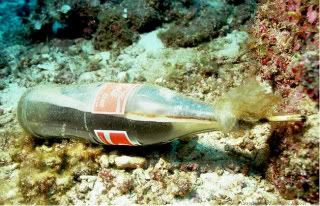


The dynamites detonated and the sheer shock instantly killed scores of fishies. They also shattered the precious corals that were the fishies' homes, the one thing that sustained the fragile ecosystem of the secret reef. But the fishermen no longer had any care, for then they jumped into the water, with nothing but pouch-bags and bamboo snorkels, and they began stuffing the dead fishies into their beltbags and the broken corals too - which could be sold to the rich people in Manila as paperweights or as decorations for their aquariums.
By the end of the day, they had collected hundreds of fishies after dynamiting more secret oasis-reefs, thus denuding the life-filled peaks of those undersea mountains. As the sun sank into the horizon, the fishermen returned to dry land, paddling as quickly as their tired bodies could - not wanting to be late for the curfew and catching the government's unwanted attention. They arrived at friendly shores, where they were greeted by their worried families.
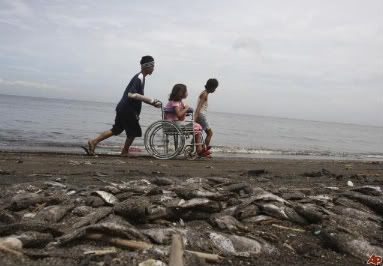
Children laughed and smiled and played with the carefree innocence of the young. They ran around the beach, one of them being pushed on a wheelchair that had belonged to an elder family member who had passed away recently when they couldn't afford her treatment and medicines. There was a puffer fish on the sand, gasping for water as its ballooned form slowly died. A laughing child came across it and began kicking it, playing kickball, sipa.
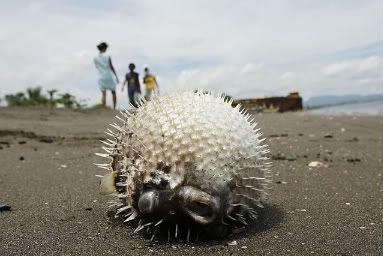
Before the child's parents could shout a warning, the puffer fish's spines stung the child's foot and soon she became ill from the poisonous fish's venom. They could not afford any medicine, so they merely tied the child's leg with rope and tried to suck the poison out of it.
****
Days later, after the fishermen finally had enough and protested to the government - and were subsequently beaten with sticks for their defiance - two children came across a beautiful blonde lady, a foreigner, a tourista. Instead of going on pre-arranged tour bus trips around the country's hand-sanitized tourist sights, she chose to walk around by herself, wishing to see the country's true face.
"Ask the American Woman, she will know," the first child said.
The second child nodded and hopped over to the foreigner lady.
"Ms. American Woman, will my foot grow back?" the child asked her innocently.
Welcome to the Philippines
Oh, man. Now I just want to cry.
ReplyDeleteDon't cry Lusy-chans! v_________v
ReplyDelete